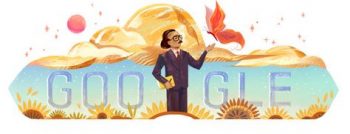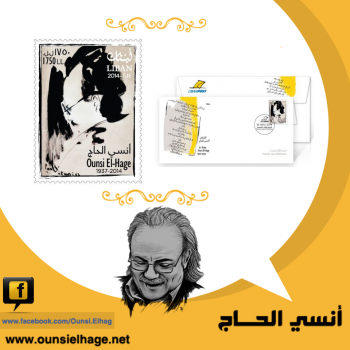Onsi El-Hajj; (1937 – 2014) Posted by Fisal on Jul 27, 2016 in Arabic Language, Culture, Pronunciation, Vocabulary
Ahlan, Arabic lovers! Today Google Doodle Middle East celebrates the 79th Birthday of the Lebanese poet Onsi El-Hajj أُنسي الحاج. Onsi El-Hajj is a famous contemporary poet, journalist and translator. He had a great influence on Arabic Modern Literature in general and poetry in particular. He was the first to introduce the “prose poem القصيدة النثرية” into Arabic.
El-Hajj was born on the 27th July, 1937 in Jezzine جزين; a small touristic town in the south of Lebanon. His father Louis El-Hajj لويس الحاج was a journalist and translator and there is no doubt that Onsi was greatly affected by him. His mother Mary Akl ماري عقل was from Qaitouli قيتولي in south Lebanon. Onsi studied at the Lycee Francais High School مدرسة الليسيه الفرنسية الثانوية and then at La Sagesse Institute معهد الحكمة. His writing talent appeared early as he began writing and publishing his literary works while in High School.

Onsi El-Hajj on Google Doodle today
In 1956, Onsi started a professional career in journalism as a director of the Cultural section of “Al-Hayat الحياة” newspaper. He then moved to “Al-Nahar النهار” newspaper and was a permanent editor responsible for the non-political content. He expanded the daily cultural column and changed it into a daily full page. In 1964, he initiated “Al-Mulhaq الملحق” magazine as a supplementary weekly cultural publication to Al-Nahar”. With others, he founded the “Poetry شعر” magazine and published his first volume of poetry “Lan لن” which is considered the first collection of prose poems in Arabic.
Onsi published numerous works of poetry and books between 1960 and 1994. He published six collections of his poetry: “Lan لن” in 1960, “The Chopped Head الرأس المقطوع” in 1963, “The Past of Forthcoming Days ماضي الأيام القادمة” in 1965, “What Have You Made with the Gold What Have You Done with the Rose ماذا صنعت بالذهب، ماذا فعلت بالوردة” in 1965, “The Messenger with Her Hair Long Until the Sources الرسولة بشعرها الطويل حتى الينابيع” in 1975 and “The Banquet الوليمة” in 1994. He also published a book of three volumes of essays entitled “Words, Words, Words كلمات، كلمات، كلمات” as well as a book of two volumes of philosophical musings and aphorisms entitled “Khawatem خواتم”.
In 1994, Lebanese soprano Majida El-Roumi ماجدة الرومي released an album entitled “Ibhath Anni ابحث عني” (Search For Me) which featured a title song in classical form with lyrics by Ounsi with operatic string themed music composed by Abdo Mounzer عبده منذر. The lyrics are about a woman asking her beloved to search for her and seek out their love everywhere in order to find her.
https://www.youtube.com/watch?v=ZIrBWBQ2G_k
El-Hajj was known for his hugely popular works of poetry. But he is also revered for his work as a translator after bringing Shakespeare’s plays to millions more people by translating them into Arabic. His work is rooted in Arab culture and politics, but it also celebrates global citizenship and the borderless joys of nature. Some of his works also were transtaled into many languages. After working on several magazines including Pan Arab women’s magazine “Al-Hasna الحسناء” and leading Arabic daily newspaper “An-Nahar”, he co-founded Beirut tabloid “Al-Akhbar الأخبار” in 2006.
When interviewed about his life, Onsi once replied in characteristic humility:
“I often told the same story. I don’t believe that it is of any interest to anyone. I have more remorse than achievements, and all that I have done I did without my knowledge. When nobody used to ask me for my opinion on things, such as love and death, I willingly said the truth, but then I stopped saying it as soon as there was someone to ask.”
Onsi died on February 18, 2014 after an extended illness
- Watch these documentaries about the poet:
******
Check us back Soon!
Peace ســلام /Salam/

Build vocabulary, practice pronunciation, and more with Transparent Language Online. Available anytime, anywhere, on any device.
About the Author: Fisal
Well, I was born near the city of Rasheed or Rosetta, Egypt. Yes, the city where the Rosetta Stone was discovered. It is a small city on the north of Egypt where the Nile meets the Mediterranean. I am a Teacher of EFL.




